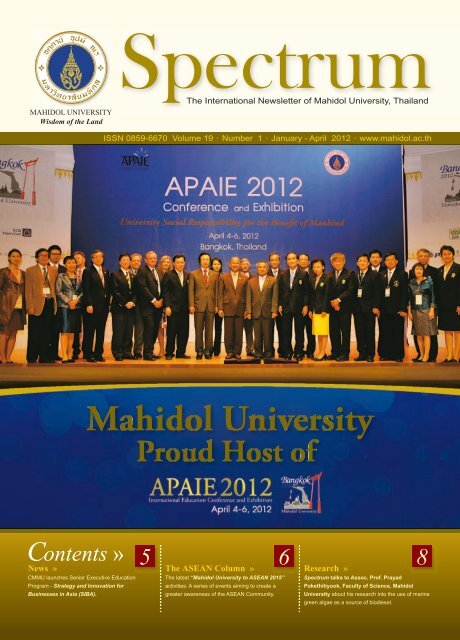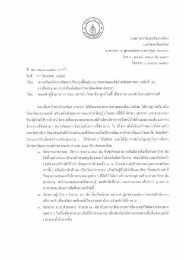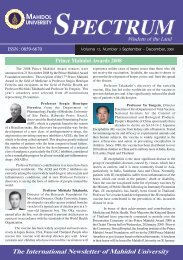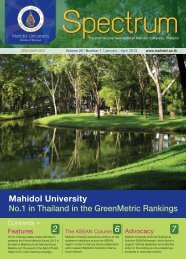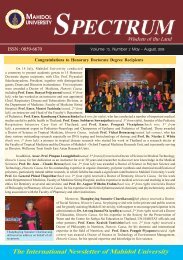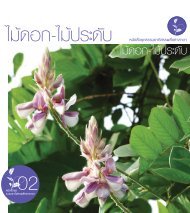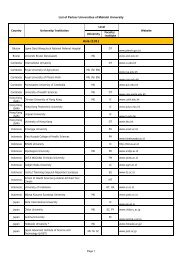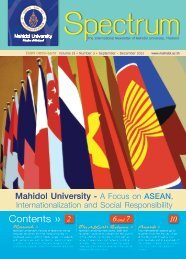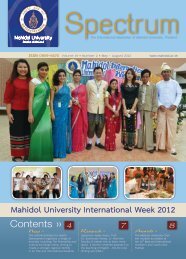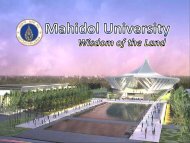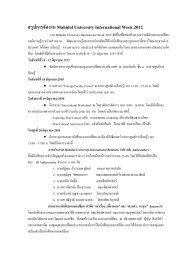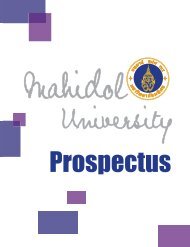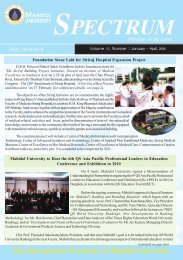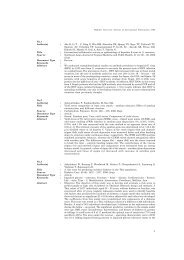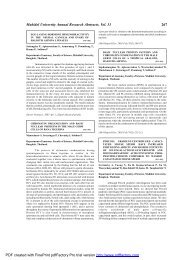Volume 19 Number 1 (January - April 2012) - Mahidol University
Volume 19 Number 1 (January - April 2012) - Mahidol University
Volume 19 Number 1 (January - April 2012) - Mahidol University
You also want an ePaper? Increase the reach of your titles
YUMPU automatically turns print PDFs into web optimized ePapers that Google loves.
The International Newsletter of <strong>Mahidol</strong> <strong>University</strong>, Thailand<br />
MAHIDOL UNIVERSITYSpectrum<br />
Wisdom of the Land<br />
ISSN 0859-6670 <strong>Volume</strong> <strong>19</strong> • <strong>Number</strong> 1 • <strong>January</strong> - <strong>April</strong> <strong>2012</strong> • www.mahidol.ac.th<br />
<strong>Mahidol</strong> <strong>University</strong><br />
Proud Host of<br />
Contents »<br />
News »<br />
CMMU launches Senior Executive Education<br />
Program - Strategy and Innovation for<br />
Businesses in Asia (SIBA).<br />
5 6 8<br />
The ASEAN Column »<br />
The latest “<strong>Mahidol</strong> <strong>University</strong> to ASEAN 2015”<br />
activities: A series of events aiming to create a<br />
greater awareness of the ASEAN Community.<br />
Research »<br />
Spectrum talks to Assoc. Prof. Prayad<br />
Pokethitiyook, Faculty of Science, <strong>Mahidol</strong><br />
<strong>University</strong> about his research into the use of marine<br />
green algae as a source of biodiesel.
2 » Features<br />
The APAIE <strong>2012</strong><br />
Conference and Exhibition<br />
Founded in 2004, and conceived as<br />
a way to unite education institutions<br />
from across the Asia Pacific region, the<br />
Asia-Pacific Association for International<br />
Education (APAIE) has become widely<br />
recognized as a leading foundation in<br />
the support of international educators,<br />
students and institutions.<br />
From 4 th – 6 th <strong>April</strong> <strong>2012</strong>, <strong>Mahidol</strong><br />
<strong>University</strong> was the proud host of the 7 th<br />
APAIE Conference & Exhibition, also<br />
known as APAIE <strong>2012</strong>. Each annual<br />
conference is intended to act as a<br />
reflection of the host university, its city<br />
and culture; therefore, APAIE <strong>2012</strong><br />
brought together around 800 education<br />
professionals from across the globe<br />
under the theme “<strong>University</strong> Social<br />
Responsibility for the Benefit of<br />
Mankind”.<br />
The view that universities have an<br />
obligation to benefit the communities<br />
they are part of is one that has become<br />
more prevalent over recent years. APAIE<br />
<strong>2012</strong> explored this theme further, and<br />
provided an excellent opportunity for<br />
university executives from around the<br />
world to discuss their universities’ social<br />
responsibility and debate global issues<br />
and challenges in higher education from<br />
different international perspectives.<br />
Via the conference sub-themes of<br />
Educational System Development,<br />
Student and <strong>University</strong> Staff Development<br />
and <strong>University</strong> and Society, APAIE <strong>2012</strong><br />
examined issues including quality<br />
assurance, student mobility, and<br />
the impact of universities upon society.<br />
His Excellency Mr. Kasem Watanachai,<br />
Privy Councilor of Thailand delivered the<br />
opening address in which he reminded<br />
the audience that “Universities exert a<br />
considerable influence on the<br />
development and well-being of society”.<br />
He added that he believed “Universities<br />
can lead-the-way in tackling the complex<br />
problems facing the world.” APAIE <strong>2012</strong><br />
also welcomed many other distinguished<br />
guests, including M.R. Disnadda Diskul,<br />
Secretary of the Mae Fah Luang<br />
Foundation under the Royal Patronage<br />
and Dr. Gwang-Jo Kim, Director of<br />
UNESCO Bangkok, who delivered the<br />
opening and closing lectures<br />
respectively. Other highlights of the event<br />
included a Presidential Roundtable which<br />
brought together executives from top<br />
global institutions to discuss “<strong>University</strong><br />
and Social Responsibility”.<br />
<strong>University</strong> Social<br />
for the Benefit
Features « 3<br />
Presidential Roundtable<br />
Dr. Gwang-Jo Kim<br />
Director, UNESCO Bangkok<br />
M.R. Disnadda Diskul<br />
Secretary of the Mae Fah Luang Foundation<br />
Responsibility<br />
of Mankind<br />
In his closing remarks, Prof. Rajata<br />
Rajatanavin, President, <strong>Mahidol</strong><br />
<strong>University</strong>, thanked all that had helped<br />
make the event such as success. He<br />
added that the event would also help the<br />
region prepare for 2015 and the<br />
establishment of the ASEAN Economic<br />
Community.<br />
APAIE <strong>2012</strong> also marked the retirement<br />
of Prof. Doo-Hee Lee from his role of<br />
President of APAIE. Prof. Lee was the<br />
founder of APAIE and over the last eight<br />
years in association with APAIE’s board<br />
of directors has helped guide its growth<br />
and development. During the closing<br />
ceremony, colleagues paid tribute to his<br />
vision and determination in establishing<br />
APAIE. Prof. Lee was awarded the title<br />
of Honorary President of APAIE and is<br />
succeeded as President by Prof. Gordon<br />
Cheung from the Chinese <strong>University</strong> of<br />
Hong Kong.<br />
At the close of the event, participants<br />
stated that they were looking forward to<br />
APAIE 2013, which will be hosted by the<br />
Chinese <strong>University</strong> of Hong Kong.<br />
To learn more about APAIE, please visit<br />
http://www.apaie.org.<br />
Special Thanks<br />
APAIE <strong>2012</strong> would not have been<br />
possible without the dedication of a<br />
large number of people. Spectrum<br />
would therefore like to thank, Prof.<br />
Doo-Hee Lee, President of APAIE and<br />
its Board of Directors and Steering<br />
Committee and Mr. Roger Bendall for<br />
their guidance. We would also like to<br />
thank APAIE <strong>2012</strong>’s international<br />
and local sponsors for their generosity,<br />
<strong>Mahidol</strong> <strong>University</strong>’s organizing<br />
committee and Conference Online for<br />
their expert support and coordination.<br />
Finally, we would like to give special<br />
mention to APAIE <strong>2012</strong>’s student<br />
helpers and support staff for their<br />
enthusiasm throughout the conference;<br />
you were greatly appreciated by all who<br />
attended.
4 » News<br />
The Prince <strong>Mahidol</strong><br />
Awards 2011<br />
Dr. David T. Wong<br />
Prof. Aaron T. Beck<br />
Dr. Ruth F. Bishop<br />
The Prince <strong>Mahidol</strong> Award Foundation<br />
under Royal patronage was established<br />
on the 1 st <strong>January</strong> <strong>19</strong>92 to commemorate<br />
the centenary of the birth of His Royal<br />
Highness Prince <strong>Mahidol</strong> of Songkla,<br />
the founder and namesake of <strong>Mahidol</strong><br />
<strong>University</strong>. Each year, the Foundation<br />
confers two Prince <strong>Mahidol</strong> Awards upon<br />
individual(s) or institution(s) which have<br />
demonstrated outstanding and<br />
exemplary contributions to the world’s<br />
medical and public health services. Over<br />
the years, 59 individuals, groups or<br />
institutions have received the award, two<br />
of whom (Prof. Dr. Barry James Marshall<br />
and Prof. Dr. Harald Zur Hausen), went<br />
on to become Nobel Laureates.<br />
This year, their Majesties the King<br />
and Queen of Thailand graciously<br />
designated Her Royal Highness,<br />
Princess Maha Chakri Sirindhorn to<br />
preside over the Presentation Ceremony,<br />
which took place at the Chakri Throne<br />
Hall on the 25 th <strong>January</strong>.<br />
Prof. Beck developed cognitive<br />
behavioral therapy in the early <strong>19</strong>60s to<br />
treat those suffering from depression.<br />
This method focuses on how thinking<br />
affects the way a person feels and acts,<br />
and helps to modify their behavior and<br />
emotional responses. Prof. Beck has<br />
since become known as “The Father of<br />
Cognitive Behavioral Therapy”. Dr. Wong<br />
discovered fluoxetine, a selective<br />
serotonin reuptake inhibitor. 15 years<br />
later, the US Food and Drug<br />
Administration (US FDA) approved<br />
fluoxetine as an antidepressant drug<br />
under the trade name Prozac. Prozac<br />
has since helped more than 100 million<br />
patients suffering from depression.<br />
Prof. Beck and Dr. Wong were joined by<br />
Dr. Ruth F. Bishop, Professional Fellow,<br />
Dept. of Paediatrics, <strong>University</strong> of<br />
Melbourne, Australia, Prince <strong>Mahidol</strong><br />
Award 2011 Laureate in the field of<br />
Public Health for “outstanding work on<br />
Rotavirus and vaccine against Rotavirus<br />
diarrhea”. Dr. Bishop was the first person<br />
to discover that diarrhea in children<br />
under six years old was caused by<br />
Rotavirus. She also demonstrated that<br />
natural neonatal rotavirus infection<br />
provided immunity against severe<br />
diarrheal disease. This laid the<br />
groundwork for the development of a<br />
Rotavirus vaccine. This vaccine has<br />
since been widely accepted and is now<br />
used in more than 60 countries including<br />
Thailand; thus, saving lives and<br />
improving the health of millions of<br />
children worldwide.<br />
Nominations for The Prince <strong>Mahidol</strong><br />
Award <strong>2012</strong><br />
Until 31 st May <strong>2012</strong>, The Prince <strong>Mahidol</strong><br />
Award Foundation invite you to nominate<br />
candidates for next year’s awards. For<br />
more information, including details of the<br />
on-line nomination process, please visit<br />
.<br />
Receiving the Prince <strong>Mahidol</strong> Award<br />
2011 in the field of Medicine were Prof.<br />
Aaron T. Beck, Prof. Emer. Psychiatry,<br />
<strong>University</strong> of Pennsylvania, US and Dr.<br />
David T. Wong, Adjunctive Prof,<br />
Neurobiology, Indiana <strong>University</strong> School<br />
of Medicine, US who received their<br />
awards for “outstanding contributions in<br />
the development of cognitive behavioral<br />
therapy” and “ outstanding contributions<br />
in the discovery of fluoxetine” respectively.<br />
The Prince <strong>Mahidol</strong> Award 2011 Laureates were guests of honor at a Luncheon Reception,<br />
held at the Royal Princess Hotel, Bangkok on 27 th <strong>January</strong> <strong>2012</strong>. Prof. Aaron T. Beck was<br />
represented by Asst. Prof. Dr. Paul. M. Grant, <strong>University</strong> of Pennsylvania, US (front row, right)
CMMU launches Senior Executive<br />
Education Program – SIBA<br />
News « 5<br />
SIBA Session in Bangkok (27 th February - 2 nd March <strong>2012</strong>)<br />
The College of Management <strong>Mahidol</strong><br />
<strong>University</strong> (CMMU), recently launched<br />
“Strategy and Innovation for<br />
Businesses in Asia” or SIBA, a projectbased<br />
senior executive education<br />
program that aims to build the strategic<br />
and innovative management practices of<br />
its participants in order to better compete<br />
in the Asian market. This program is the<br />
collaboration between CMMU and MIT<br />
Sloan School of Management,<br />
Massachusetts, US.<br />
training session at CMMU followed by a<br />
week at MIT Sloan School of<br />
Management, US.<br />
On 16 th March <strong>2012</strong>, SIBA’s first batch<br />
of senior executives returned from their<br />
training session in the US, reporting that<br />
they were very satisfied with the<br />
program and ready to apply what they<br />
had learned to their own companies.<br />
(From left) Asst. Dr. Vichita Ractham<br />
(Vice Dean for Academic Services, CMMU),<br />
Assoc. Prof. Dr. Rassmidara Hoonsawat<br />
(Dean, CMMU), Dr. Chaiyawat Wibulsawasdi<br />
(Chairman, SIBA Senior Advisory Board),<br />
Dr. Somkid Jatusripitak, Prof. Rajata<br />
Rajatanavin (President, <strong>Mahidol</strong> <strong>University</strong>),<br />
and Lecturer Natwut Amornvivat Executive<br />
Program Director, CMMU)<br />
SIBA is supervised by Asst. Prof.<br />
Dr. Vichita Ractham, Vice Dean for<br />
Academic Services and Program Chair<br />
of Innovation in Management<br />
International Program at CMMU, and<br />
lecturer Natwut Amornvivat, Executive<br />
Program Director. It offers a one week<br />
SIBA Session at MIT<br />
Sloan School of<br />
Management, US<br />
(12 th – 16 th March <strong>2012</strong>)<br />
Creative Economy<br />
Institute Unveiled<br />
On the 23 rd March <strong>2012</strong>, <strong>Mahidol</strong><br />
<strong>University</strong> introduced its project to<br />
establish a Creative Academy for Cultural<br />
and Heritage Tourism. The Academy<br />
aims to develop model communities<br />
in cultural tourism. These will be based<br />
on research into trends in tourism,<br />
the transfer of industry know-how, plus<br />
the support of intellectual property<br />
management, entrepreneurship<br />
education, integrated business<br />
counseling, and training programs.<br />
The launch event, which was held at<br />
<strong>Mahidol</strong> <strong>University</strong> International College,<br />
featured a keynote speech by former<br />
prime minister and leader of Thailand’s<br />
Democrat Party Mr. Abhisit Vejjajiva<br />
entitled “Policy on Creative Economy and<br />
Thailand’s Tourism”. The event also<br />
featured a panel discussion, “Creative<br />
Tourism and Life Enrichment”, which<br />
included columnist Ms. Ploy Jariyavej;<br />
theme village operator, Ms. Patara<br />
Sahawat; and actor, Mr. Jesdaporn<br />
Pholdee, all of whom shared their views<br />
on how to promote creative industry and<br />
cultural tourism.<br />
The event was also attended by <strong>Mahidol</strong><br />
<strong>University</strong> executives led by Prof. Rajata<br />
Rajatanavin, President, <strong>Mahidol</strong> <strong>University</strong>.<br />
Prof. Rajata Rajatanavin, President (left)<br />
with Mr. Abhisit Vejjajiva, Leader of<br />
the Democrat Party (right)
6 » The ASEAN Column<br />
Countdown<br />
to 2015<br />
An increased regional stability through<br />
greater cultural and political understanding<br />
is just one of the anticipated benefits<br />
of the establishment of the ASEAN<br />
Community in 2015. Unfortunately,<br />
many people across the region remain<br />
unaware of the community and<br />
the opportunities and challenges<br />
it will bring. Others consider ASEAN to<br />
be mostly an academic or political issue,<br />
only of concern to government officials.<br />
For these reasons, <strong>Mahidol</strong> <strong>University</strong><br />
and its faculties continues to embark on<br />
a series of activities intending to create a<br />
greater awareness of the ASEAN<br />
Community and its importance to<br />
the region’s future.<br />
On the 8 th March <strong>2012</strong>, <strong>Mahidol</strong> <strong>University</strong><br />
was honored to welcome His Excellency<br />
ASEAN Secretary-General, Dr. Surin<br />
Pitsuwan (pictured), who delivered an<br />
address entitled “A Next Step forward for<br />
Thai Universities in ASEAN”, at the MU<br />
Open Door to ASEAN forum and<br />
exhibition. This event was one of the<br />
latest activities under the “<strong>Mahidol</strong><br />
<strong>University</strong> to ASEAN 2015” banner; a<br />
series of events intending to create a<br />
greater awareness of the ASEAN<br />
Community. During his address,<br />
Dr. Pitsuwan informed the audience<br />
H.E. ASEAN Secretary-General,<br />
Dr. Surin Pitsuwan<br />
gathered at the <strong>Mahidol</strong> Learning Center,<br />
Salaya that “Education is an important<br />
mechanism in the development of quality<br />
and competent human resources that<br />
would enhance in Thailand’s<br />
competitiveness ASEAN and the world.”<br />
Following this, Prof. Rajata Rajatanavin,<br />
President, reaffirmed <strong>Mahidol</strong><br />
<strong>University</strong>’s commitment to excellence<br />
in research. He added that the university<br />
needs to develop graduates who have<br />
good analytical and conceptual skills and<br />
the ability to integrate knowledge from<br />
several fields of study. Other activities<br />
and events held from 8 th to 9 th March<br />
<strong>2012</strong> under the MU to ASEAN banner<br />
included an exhibition “A Journey through<br />
ASEAN”, games, ASEAN food<br />
and music.<br />
Collaboration through friendship<br />
Across <strong>Mahidol</strong> <strong>University</strong>, the<br />
importance of the ASEAN Community is<br />
being recognized and individual faculties<br />
and institutes are organizing their own<br />
ASEAN-related events. In fact, the<br />
ASEAN Institute for Health Development<br />
(AIHD) are once again in the process<br />
Prof. Rajata Rajatanavin, President and<br />
Assoc. Prof. Yaowalark Sukthana,<br />
Vice President for Education,<br />
<strong>Mahidol</strong> <strong>University</strong><br />
of planning their latest “ASEAN Camp<br />
on Friendship and Cultural Exchange”.<br />
Greater regional cooperation is crucial to<br />
the future of health development in the<br />
region; therefore, this annual event aims<br />
to provide AIHD students with information<br />
about the ASEAN Community. Previous<br />
events have helped create friendships<br />
and greater understanding between<br />
young people. As 2015 approaches, it is<br />
hoped that these bonds will grow<br />
stronger and lead to greater regional<br />
collaboration in the field of human<br />
and public health.
<strong>University</strong> Executives<br />
Receive National Awards<br />
in Medicine and Public Health<br />
Awards « 7<br />
On the 8 th March <strong>2012</strong>, Prof. Rajata<br />
Rajatanavin, President and Assoc. Prof. Pithaya<br />
Charupoonphol, Dean, Faculty of Public Health,<br />
<strong>Mahidol</strong> <strong>University</strong> were honored with the 2011<br />
National Hospital Administrator Award<br />
(Specialized Hospital Administrator Category)<br />
and National Preventative Medicine Practitioner<br />
Award (Public Health Category) respectively.<br />
Presented by the Hospital Administrators<br />
Association and Preventative Medicine<br />
Association of Thailand, the awards recognize<br />
the dedication and outstanding achievements of<br />
hospital administrators and practitioners of<br />
Medicine and Public Health.<br />
Assoc. Prof. Dr. Sooksan Kantabutra,<br />
Program Chair of Human Resource<br />
Management, International Program,<br />
at the College of Management <strong>Mahidol</strong><br />
<strong>University</strong> (CMMU) received an<br />
“Outstanding Leadership Award” at the<br />
World HRD Congress <strong>2012</strong> in Mumbai,<br />
India. The award is one of the most<br />
prestigious in the field of Human<br />
Resources and Dr. Kantabutra is the first<br />
Thai scholar to receive it.<br />
Outstanding Leadership<br />
in Human Resources<br />
Held annually over the past 20 years,<br />
the World HRD Congress is a non-profit<br />
organization. Past recipients of awards<br />
include professors from some of the<br />
world’s top business schools including<br />
the London Business School, ESSEC<br />
Business School in France, the<br />
<strong>University</strong> of Michigan School of<br />
Business Administration in the USA,<br />
Instituto de Empresa Business School<br />
in Spain, and The Hong Kong <strong>University</strong><br />
of Science and Technology Business<br />
School.<br />
During the award ceremony,<br />
Dr. Kantabutra delivered his address<br />
entitled “Sufficiency Economy Leadership<br />
Practices: A Thai Approach to Corporate<br />
Sustainability”, which was well received<br />
by the audience. At CMMU,<br />
Dr. Kantabutra has been instrumental<br />
in designing the CMMU Master of<br />
Management in HR program, the first<br />
Master’s program of its kind in Thailand.<br />
To learn more about CMMU’s Master of<br />
Management in HR program, please visit<br />
http://www.cmmu.mahidol.ac.th/cmmu/<br />
Young Veterinarian Award<br />
Department of Biomedical Engineering,<br />
Faculty of Engineering.<br />
Congratulations to Dr. Warangkhana<br />
Panwanich, a graduate student from the<br />
Master of Engineering Program in<br />
Biomedical Engineering, on winning the<br />
“Young Veterinarian Oral Presentation<br />
Award” at the 37 th International<br />
Conference on Veterinary Science held<br />
on the 2 nd March <strong>2012</strong> at the IMPACT<br />
Exhibition and Convention Center,<br />
Muang Thongtani, Thailand.<br />
Dr. Panwanich received the award for her<br />
presentation entitled “Animal-assisted<br />
therapy for persons with disabilities via<br />
brain-computer interface system” and<br />
was supported by her advisor, Asst. Prof.<br />
Yodchanan Wongsawat from the<br />
The Department of Biomedical<br />
Engineering was founded in 2005.<br />
Currently, the department offers<br />
academic programs at the Bachelor’s,<br />
Master’s and Ph.D levels. Adopting a<br />
multi-disciplinary approach to research,<br />
the department collaborates with many<br />
of <strong>Mahidol</strong> <strong>University</strong>’s medical<br />
institutions, including the Faculty of<br />
Veterinary Science.<br />
To learn more about the Department<br />
of Biomedical Engineering, Faculty of<br />
Engineering, please visit http://www.<br />
eg.mahidol.ac.th/dept/egbe/
8 » Research<br />
Advances in Biodiesel Production from Alage:<br />
An Interview with Assoc. Prof. Prayad Pokethitiyook, Faculty of Science<br />
The world’s reserves of crude oil are finite. In fact, many people believe<br />
that we may have already passed the point of peak oil production using<br />
traditional methods such as drilling. However, the demand for fuel remains.<br />
As a result, there has been a move toward the extraction of oil from<br />
non-traditional sources, such as tar sands. Unfortunately, these activities may<br />
not be enough to meet the global demand and they are often associated<br />
with adverse environmental impacts. The production of Biodiesel from<br />
natural products is therefore a promising alternative. Spectrum took the<br />
opportunity to meet with Assoc. Prof. Prayad Pokethitiyook, Chairman of the<br />
Department of Biology, Faculty of Science; a leading expert in the<br />
production of biodiesel from marine green algae.<br />
Spectrum: Can you give our readers a<br />
little background into the use of algae<br />
in the energy sector?<br />
Assoc. Prof. Pokethitiyook: Research<br />
into algae production was originally<br />
focused on the animal feed industry,<br />
particularly aquaculture, but then<br />
producers noticed that algae produces<br />
oil in the form of lipids when under<br />
stress conditions i.e. not receiving<br />
enough food in the form of Nitrates or<br />
Ammonia. There are many species of<br />
green algae that produce oil. However,<br />
we need to identify species that<br />
accumulate lipids (oil) in droplet form and<br />
have thin membranes, as this makes<br />
them easier to break down. We also<br />
need to use marine algae as these<br />
species are less likely to be consumed<br />
by zooplankton (micro-predators) when<br />
grown in open, in-land pond systems.<br />
Spectrum: How can biodiesel from<br />
algae be produced in the amounts<br />
needed?<br />
can reduce the cost of biodiesel<br />
produced from algae by 25% we could<br />
be much more competitive. Therefore,<br />
within the next year or two, we plan to<br />
establish a pilot plant at the Faculty of<br />
Science in order to study the<br />
commercialization of this process. The<br />
current world leaders in this technology<br />
are China, the US, New Zealand and<br />
Australia. However, Thailand is in a good<br />
position.<br />
Spectrum: You are a member of THINK<br />
ALGAE. Can you tell our readers more<br />
about this network?<br />
Assoc. Prof. Pokethitiyook: THINK<br />
ALGAE is sponsored by the Petroleum<br />
Authority of Thailand (PTT) and is a<br />
consortium of organizations including<br />
PTT, <strong>Mahidol</strong> <strong>University</strong>, TISTR, Biotec-<br />
NSTDA, King Mongkut <strong>University</strong> of<br />
Technology Thonburi (KMUTT) and<br />
Chulalongkorn <strong>University</strong>’s Faculty of<br />
Engineering. It is in the third year of a ten<br />
year project under which PTT Thailand<br />
aims to push the use of biodiesel from<br />
algae as a viable alternative to the use of<br />
normal diesel and palm oil.<br />
Spectrum: THINK ALGAE is<br />
co-organizing the forthcoming<br />
2 nd Asia-Oceania Algae<br />
Innovation Summit (AOAIS<br />
<strong>2012</strong>). Can you tell our readers<br />
more about this event?<br />
Assoc. Prof. Pokethitiyook: The 2 nd Asia<br />
Oceania Algae Innovation Summit will<br />
be held from 3 rd – 5 th September, <strong>2012</strong>.<br />
Topics will include algae biology and<br />
physiology, cultivation, harvesting and<br />
extraction.<br />
You can learn more about AOAIS <strong>2012</strong>,<br />
by visiting the summit’s website at<br />
<br />
Deadline for the submission of abstracts<br />
is the 31 st of May <strong>2012</strong><br />
Assoc. Prof. Pokethitiyook: One kilogram<br />
of green algae (dry weight) produces<br />
around 250-350 grams of oil; this is<br />
similar to the amounts seen in palm oil<br />
production. The advantage over palm oil<br />
is that algae can double its size in less<br />
than 24 hours, while palm oil takes 3-5<br />
years of growth before oil production can<br />
take place. The biggest problem we<br />
currently face is the cost of production,<br />
as this is around US$ 180 per barrel.<br />
This compares with a price of around<br />
US$ 130 per barrel for crude oil. If we<br />
Dr. Pailin Chuchottaworn, CEO of PTT (center) and Assoc. Prof. Prayad Pokethitiyook is<br />
pictured 2 rd from right at the THINK ALGAE signing ceremony. The event was attended by<br />
Prof. Skorn Mongkolsuk, Dean, Faculty of Science, <strong>Mahidol</strong> <strong>University</strong> (4 th from left) and<br />
representatives from Chulalongkorn <strong>University</strong>, King Mongkut <strong>University</strong> of Technology<br />
Thonburi, Biotec and TISTR.
Conferences « 9<br />
H<br />
HRH Princess Maha Chakri Sirindhorn<br />
(pictured center) presided over the opening<br />
ceremony of <strong>Mahidol</strong> International<br />
Conference on Infections and Cancers<br />
<strong>2012</strong> at the Landmark Hotel, Bangkok.<br />
Prof. Rajata Rajatanavin, President,<br />
<strong>Mahidol</strong> <strong>University</strong>; Prof. Dr. Skorn<br />
Mongkolsuk, Dean, Faculty of Science;<br />
Prof. Emer. Dr. Pornchai Matangkasombat,<br />
Former President; Prof. Prasit<br />
Palittapongarnpim, Vice President for<br />
Research; and other university<br />
administrators were also in attendance.<br />
The conference, which ran<br />
from the 6 th – 8 th February <strong>2012</strong>, aimed to<br />
provide a platform for leading scientists<br />
and experts from within Thailand and<br />
across the globe to exchange knowledge<br />
and scientific advancements on methods<br />
for the prevention of infections and<br />
treatments for patients with chronic<br />
infections and infection-associated<br />
cancers.<br />
The meeting featured an array of<br />
presentations by world-renowned<br />
scientists on recent advances in research<br />
and new technologies such as genome<br />
sequencing and proteomics, which<br />
could pave the way for the detection of<br />
<strong>Mahidol</strong> International<br />
Conference on Infections<br />
and Cancers <strong>2012</strong><br />
microbes that may cause cancers,<br />
plus the better diagnosis and prevention<br />
of diseases.<br />
Keynote speakers included Prof. Harald<br />
Zur Hausen, 2008 Nobel and 2005<br />
Prince <strong>Mahidol</strong> Award Laureate, who<br />
gave a presentation on various cancers<br />
caused by virus infections. Also attending<br />
was Prof. Barry J. Marshall, 2005 Nobel<br />
and 2001 Prince <strong>Mahidol</strong> Award Laureate,<br />
who discussed the significance and<br />
advances in research on Helicobacter<br />
pylori, the bacterium linked to the<br />
development of stomach cancer.<br />
The 3 rd Annual<br />
International Conference<br />
for English Language Teaching in Asia<br />
As the creation of the ASEAN<br />
Community draws near, a core group<br />
of Asian Universities is collaborating in<br />
the teaching of the English language.<br />
From the 16 th - 17 th <strong>January</strong> <strong>2012</strong>, this<br />
relationship was on full display at the<br />
3 rd Annual International Conference for<br />
English Language Teaching in Asia.<br />
Hosted by the Faculty of Liberal<br />
Arts, <strong>Mahidol</strong> <strong>University</strong>, and held at the<br />
Salaya Pavilion Hotel, <strong>Mahidol</strong> <strong>University</strong><br />
International College (MUIC), the event<br />
brought together speakers from 11<br />
different countries in order to present<br />
their research findings on teaching<br />
English in Asia. Guest speakers were<br />
joined by keynote addresses from<br />
Dr. Mats Oscarson, from the <strong>University</strong><br />
of Gothenburg and Damon Anderson,<br />
Regional Director of English Learning for<br />
the US Embassy in Southeast Asia.<br />
The event was attended by students<br />
from both the Faculty of Liberal Arts and<br />
MUIC, and all presentations will be<br />
published in a new international journal<br />
established for the occasion, entitled<br />
“Voices in Asia”. It is hoped that future<br />
collaboration will continue in a variety of<br />
ways including : the exchange of faculty,<br />
academic research projects and the<br />
building of relations between participating<br />
Universities. It has yet to be determined<br />
where the 4 th International Conference<br />
for English Language Teaching in Asia<br />
will be held, but one thing is for certain;<br />
<strong>Mahidol</strong> <strong>University</strong> will play a major role<br />
in this effort.
10 » Conferences continued<br />
Faculty of Public Health hosts<br />
APACPH International Accreditation<br />
Conference and Executive Board Meeting<br />
F<br />
From the 29 th to the 30 th March <strong>2012</strong>,<br />
the Faculty of Public Health, <strong>Mahidol</strong><br />
<strong>University</strong>, hosted an International<br />
Accreditation Conference on behalf of<br />
the Asia Pacific Academic Consortium for<br />
Public Health (APACPH). Organized by<br />
the Faculty’s International & Public<br />
Relations Unit, the conference aimed to<br />
explore ways to standardize Public<br />
Health Education in the Asia Pacific<br />
Region through providing common<br />
competencies and an Accreditation body<br />
to facilitate the process. APACPH<br />
President-elect Dean Phitaya<br />
Charupoonphol presided over the<br />
New Agreements<br />
two-day conference which saw<br />
attendance from numerous influential<br />
Public Health experts from eight<br />
countries, including Japan, USA, South<br />
Korea, China, Sri Lanka and Malaysia.<br />
The following day, the Faculty of Public<br />
Health also hosted the annual APACPH<br />
Management Board Meeting with<br />
APACPH President Mohd Amin Jalaludin<br />
(front row, centre) and President-elect<br />
Dean Phitaya Charupoonphol (front row,<br />
right) chairing the meeting. The Board<br />
meeting allowed APACPH members to<br />
voice their opinions and concerns with<br />
MoU Signing with Research Center<br />
for Zoonosis Control, Hokkaido <strong>University</strong>, Japan<br />
regards to the key outcomes of the<br />
Accreditation Conference, future projects<br />
and fundraising opportunities.<br />
“We truly appreciate the hospitality and<br />
excellence of the meeting and future<br />
plans for the accreditation. I really<br />
enjoyed the days with APACPH<br />
colleagues in Bangkok” -Tomiko<br />
Hokama: Former APACPH President.<br />
D<br />
Diseases of animals that can be<br />
transmitted to people, also known as<br />
zoonosis, are one of the most serious<br />
issues currently facing the global health<br />
community. Unfortunately, the control of<br />
these diseases does not conveniently<br />
conform to one particular academic<br />
category. Meanwhile, their impacts<br />
continue to cross national and regional<br />
borders. Therefore, a multidisciplinary<br />
and international approach to zoonosis<br />
control is required. Recognizing this,<br />
on the 22 nd February <strong>2012</strong>, at the Office<br />
of the President, Salaya Campus, Prof.<br />
Rajata Rajatanavin, President, <strong>Mahidol</strong><br />
<strong>University</strong> welcomed Prof. Hiroshi Kida,<br />
Director of Hokkaido <strong>University</strong> Research<br />
Center for Zoonosis Control on the<br />
AIHD Signs MoU on Psychological<br />
Development in Thailand<br />
occasion of the signing and extension of<br />
the MoUs between the Research Center<br />
for Zoonosis Control, Hokkaido <strong>University</strong>,<br />
Japan and <strong>Mahidol</strong> <strong>University</strong>’s Faculty<br />
of Public Health, Faculty of Medicine<br />
Siriraj Hospital and Faculty of Veterinary<br />
Science. In his congratulatory address,<br />
President Rajatanavin applauded the<br />
partner institutions on their foresight<br />
in dealing with this serious issue and<br />
urged them to take full advantage of their<br />
partnership.<br />
O<br />
On the 27 th March <strong>2012</strong>, the ASEAN<br />
Institute for Health Development (AIHD),<br />
<strong>Mahidol</strong> <strong>University</strong>, headed by Dr. Supattra<br />
Srivanichakorn, Director, signed a MoU<br />
in the Boonsiri Room with two well-known<br />
American institutes of psychology - the<br />
Institute for International Connection (IIC)<br />
and the Virginia Satir Global Network.<br />
The institutions were represented by<br />
Dr. Laura Sue Dodson, President of IIC<br />
and Ms. Sharon Loeschen, President of<br />
Virginia Satir Global Network respectively.<br />
The agreement is designed to facilitate<br />
psychological training with a view to<br />
developing psychological practices in<br />
Thailand over a period of two years.<br />
During the signing ceremony<br />
Dr. Srivanichakorn stated that “The AIHD<br />
is not only an institution which networks<br />
with other institutions; it also consists of<br />
groups of people who come to study from<br />
a wide variety of fields—doctors, nurses,<br />
teachers, psychologists, social workers,<br />
health workers, development specialists,<br />
etc.—to gain a deeper knowledge of<br />
psychology in order to work well and<br />
to have the opportunity to consult and<br />
network with each other”. Prof.<br />
Maureen A. Graves, former President of<br />
the Virginia Satir Global Network, added<br />
“Uniting training with consultation is<br />
an important step in helping produce the<br />
experience of the inner-self. Having<br />
self-insight is a good foundation that<br />
will allow people to help others and will<br />
also provide the opportunity to share<br />
experiences as they discover their own<br />
potential”.
Research « 11<br />
Outstanding Research into the Causes and<br />
Treatment of Neurodegeneration<br />
Among the winners of the recent National Research Council of Thailand awards was<br />
Prof. Piyarat Govitrapong, from the Institute of Molecular Biosciences, <strong>Mahidol</strong> <strong>University</strong><br />
who received the Outstanding Research Award 2011 in the field of neuroscience for her<br />
research into “Mechanism of Amphetamine-induced Neuronal Death and Neurodegeneration”<br />
Spectrum met with Prof. Govitrapong to learn more about her research and to congratulate<br />
her on her award.<br />
The Research Center<br />
for Neuroscience,<br />
<strong>Mahidol</strong> <strong>University</strong><br />
Prof. Govitrapong is head of the<br />
Research Center for Neuroscience<br />
based at <strong>Mahidol</strong> <strong>University</strong>’s Institute<br />
of Molecular Biosciences, and has been<br />
with the institute for over 25 years.<br />
Neuroscience is a relatively new area of<br />
research for Thailand. However, following<br />
two awards and funding from the<br />
Thailand Research Fund,<br />
Prof. Govitrapong’s work is helping the<br />
country establish itself in this important<br />
area.<br />
The dangers of amphetamine abuse<br />
Prof. Govitrapong’s award winning<br />
research has revealed that the use of<br />
amphetamine drugs has serious<br />
implications for people in later life. The<br />
use of amphetamines and amphetamine<br />
derivatives has become an international<br />
public health problem, with an estimated<br />
15-16 million users worldwide.<br />
Prof. Govitrapong’s research has found<br />
that chronic or intermittent amphetamine<br />
abuse may create temporary or<br />
permanent disturbances in the brain’s<br />
dopamine producing pathways. The<br />
neurotransmitter dopamine has an<br />
important role in many brain functions<br />
including behavior and cognition and<br />
voluntary movement. Therefore,<br />
disruptions to this pathway may<br />
predispose amphetamine users to<br />
Parkinson’s disease in later life (a brain<br />
disorder caused by the death of<br />
dopamine-generating cells and which<br />
causes sufferers to have difficulty with<br />
walking, movement, and coordination).<br />
The results remind us all of the dangers<br />
of drug abuse.<br />
Treatment with Melatonin<br />
One of Prof. Govitrapong’s main<br />
research interests is melatonin, the<br />
hormone produced by the pineal gland<br />
during sleep, and which regulates the<br />
24-hour rhythm of some the body’s<br />
biological processes (circadian rhythm).<br />
Melatonin is well known for the<br />
protective effects attributed to its<br />
free-radical scavenging and antioxidant<br />
properties. Fortunately,<br />
Prof. Govitrapong’s research has also<br />
revealed that melatonin pretreatment can<br />
help prevent the loss of dopamine<br />
producing cells due to amphetamine<br />
abuse; therefore, offering the hope of a<br />
treatment.<br />
Further research<br />
Prof. Govitrapong’s research continues,<br />
and she is examining the use of<br />
melatonin in the treatment of Parkinson’s<br />
and Alzheimer’s diseases. In addition,<br />
following trials with hippocampus stem<br />
cells from rats and mice, Prof.<br />
Govitrapong is studying the use of<br />
melatonin in therapies for those who<br />
have suffered damage to the<br />
hippocampus region of the brain; one of<br />
the first parts of the brain to suffer<br />
damage in those suffering from<br />
Alzheimer’s disease.<br />
The National Research Council of<br />
Thailand Awards<br />
Several other <strong>Mahidol</strong> <strong>University</strong> faculty<br />
members and researchers from various<br />
fields were also among the recipients<br />
of the National Research Council of<br />
Thailand Awards across all four<br />
categories (national outstanding<br />
researchers, research, thesis and<br />
invention). Deputy Prime Minister<br />
General, Yuthasak Sasiprapa presided<br />
over the award-presentation ceremony,<br />
held as part of the celebrations to mark<br />
Inventors’ Day on the 2 nd February, <strong>2012</strong><br />
at Impact Arena, Muang Thongthani,<br />
Thailand.<br />
Damage caused to the Dopamine producing<br />
pathway caused by amphetamine (AMPH) use<br />
To find out more about Prof. Govitrapong<br />
and research at the Institute of Molecular<br />
Biosciences, please visit http://www.<br />
mb.mahidol.ac.th/index.php
12 » Contacts<br />
Distinguished Visitors to <strong>Mahidol</strong> <strong>University</strong><br />
1<br />
2<br />
3<br />
4<br />
5<br />
6<br />
15.03.12 Asst. Prof. Anadi Nitithamyong, Deputy Dean for Student Services and International Relations,<br />
Faculty of Graduate Studies welcomed Prof. Richard Watkins, Pro Vice-Chancellor for Strategic Planning,<br />
International Relations & Teaching and Ms. Adeline Yong, Manager Strategic Development, Taylor’s <strong>University</strong>,<br />
Malaysia. The meeting, which took place at the Office of the President, Salaya campus discussed academic<br />
collaboration between <strong>Mahidol</strong> <strong>University</strong> and Taylor’s <strong>University</strong> in the fields of Medicine, Pharmacy, Public<br />
Health and Science. (Picture 1)<br />
24.02.12 A group of journalists from leading European scientific publications paid a visit to <strong>Mahidol</strong><br />
<strong>University</strong> as part of their tour of ASEAN member countries organized by SEA-EU-NET, a bi-regional project<br />
aiming to expand science and technology cooperation between Southeast Asia and Europe. The group,<br />
consisting of journalists from Austria, France, Germany, Hungary, the Netherlands, UK, Poland and Turkey,<br />
was welcomed by Asst. Prof. Surakit Nathisuwan, Vice President for International Relations, and was given<br />
the opportunity to meet with members of the <strong>Mahidol</strong> <strong>University</strong>’s research community at the Biochemistry<br />
Department Meeting Room, Faculty of Science, Phayathai. Presenting their outstanding and award winning<br />
research were Prof. Timothy William Flegel, Faculty of Science, on the application of biotechnology in the<br />
production of premium shrimp; Prof. Nick White, Faculty of Tropical Medicine, on malaria and the prevention<br />
of antimalarial drug resistance; Prof. Pilai Poonswad, on the conservation of hornbills; and Prof. Prasert<br />
Auewarakul, Institute of Molecular Biosciences, on influenza and bird flu. (Picture 2)<br />
07.02.12 Dr. Puwat Charukamnoetkanok, Assistant to the President for International Relations and a<br />
delegation from <strong>Mahidol</strong> <strong>University</strong> International College, the College of Sports Science and Technology and<br />
the Faculty of Information and Communication Technology met with Dr. Simon Dowell, International Affairs<br />
Manager, Faculty of Science and Mr. Jeffery Soong, Regional Director (South East Asia) Liverpool John<br />
Moores <strong>University</strong>, UK at the Office of the President. Discussions focused on greater collaboration between<br />
the two universities. (Picture 3)<br />
23.01.12 Dr. Kevin Robertson, Associate Dean, Learning & Teaching, School of Life Sciences and<br />
Ms. Ruth Crabtree, Director of International Development, School of Life Sciences, Northumbria <strong>University</strong>,<br />
Newcastle, UK, visited the Faculty of Social Sciences and Humanities and met with representatives led by<br />
Assoc. Prof. Dr. Wariya Chinwanno, Dean of the Faculty. During a meeting held in the Faculty’s Kanpai<br />
<strong>Mahidol</strong> Conference Room, potential opportunities for collaboration between the two institutions were<br />
discussed (Picture 4). Later, on 27.01.12, Faculty members met with Dr. Erkan Kirbiyik from the Foreign<br />
Relations Department, Suleyman Demirel <strong>University</strong>, Turkey, and Mr. Zeki Parliti, Cultural Affairs Director,<br />
Thai Turkish Business Association, Thailand in order to discuss future areas of cooperation.<br />
23.01.12 A delegation from the Asian Football Confederation (AFC) President’s Travelling Fellowship for<br />
Football Medicine visited the College of Sports Science and Technology, where they were met by a delegation<br />
led by Prof. Arth Nana, Dean of the College. The AFC group consisted of three doctors from Malaysia, Oman<br />
and Iran. They were joined by a physiotherapist from Thailand. The Travelling Fellowship program is an<br />
initiative of the AFC and aims to support the provision of high-level healthcare services to football players in<br />
Asia. (Picture 5)<br />
05.01.12 Prof. Peter Van der Veer, Director of the Max Planck Institute for the Study of Religious and<br />
Ethnic Diversity at Göttingen, visited the Research Institute for Languages and Cultures of Asia (RILCA). Prof.<br />
Van der Veer is conducting a comparative study of urban aspirations in Asian mega-cities, including Mumbai,<br />
Singapore, Shanghai and Seoul and will join RILCA as a visiting professor. It is planned that Prof. Van de Veer<br />
will help develop the curriculum and offer lectures to students of the International PhD Program in Multicultural<br />
Studies due to be introduced in <strong>2012</strong>. (Picture 6)<br />
Spectrum<br />
Published by International Relations Division, Office of the President, <strong>Mahidol</strong> <strong>University</strong><br />
999 Phuttamonthon 4 Road, Salaya,<br />
Phuttamonthon, Nakhon Pathom 73170, Thailand<br />
Tel. : +66 (0) 2849 6230 (Director), +66 (0) 2849 6231 - 3, 2849 6235 - 6<br />
Fax. : +66 (0) 2849 6237 E-mail : opinter@mahidol.ac.th<br />
MAHIDOL UNIVERSITY<br />
Wisdom of the Land<br />
272 Rama VI Rd., Ratchathewi, Bangkok 10400, Thailand (Bangkok Office)<br />
Website : www.mahidol.ac.th<br />
Advisors : Asst. Prof. Surakit Nathisuwan, Dr. Puwat Charukamnoetkanok<br />
Chief Editor : Ms. Boonyarat Suwanchinda<br />
Editorial Staff : Mr. Paul Bulcock, Ms. Suchada Phruthonkul, Ms. Peungjai Tinsulanonda


